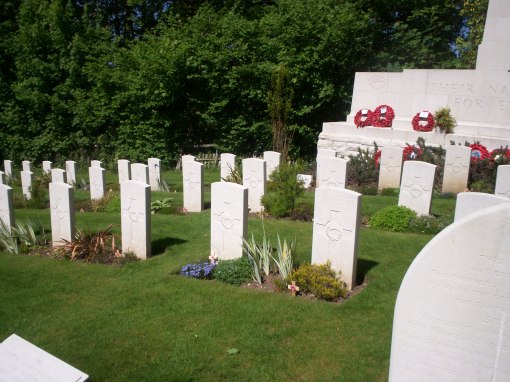I came across a book in a second hand shop and picked it up simply because I rather liked the title and the plain cover. It proved to be a collection of chapters from the longer work “A Student in Arms” – combining observations on a soldier’s life during WWI with reflections upon faith and religion. Hankey’s an interesting person, whose words are very much of his time. And some of his musings are distinctly slashy.
The first chapter describes an officer, Ronald Hardy, in glowing terms that verge on hero worship. The bit about Hardy’s smile, “It was something worth living for and worth working for”, reminds me of The Charioteer, where Laurie remembers Ralph Lanyon at school, and how boys competed fiercely and tacitly to earn one of his smiles.
Then there’s the chapter “Some who were lost and found”, which is full of stuff reflecting a wonderfully open heart towards some of the soldiers he met. “If they did fly in the face of the conventions, well, we sometimes felt that the conventions deserved it.” One line intrigues me. He’s talking about the men and their relationships with women. “They had their code, and though God forbid that it should ever be ours, it did somehow seem to be a natural set off to the somewhat sordidly prudent morality of the marriage market.”
I really can’t work out what Hankey means by that little dig at marriage, apart from the obvious implication that he didn’t himself want to be married. For whatever reason. You see, it’s really hard at times to understand the words of the past when the only filter we have is our modern ears and eyes.
I read a lot of literature written either side of 1900, and while people haven’t changed, society and conventions have. In the days of “Three Men in a Boat”, men staying in a hotel would have shared a bed if need be with no implications other than necessity. And lines like, “I never saw two men do more with one-and-twopence worth of butter in my whole life than they did.” could be written in complete innocence of any double entendre. (They accidentally smeared it all over the stuff they were packing, in case you’re wondering.)
Writers would use the word “love” in a wider context, too. Ronnie Poulton Palmer was a stunning pre-WWI rugby player, the sort of three-quarter who could slice through defences like a knife through butter. His last words are said to be, “I shall never play at Twickenham again” although that’s likely to be apocryphal as it seems he was shot and died instantaneously. I can, however, imagine a player saying just that sort of thing ironically.
Poulton seems to have inspired a great deal of affection from his friends and extracts from letters such as this from Keith Rae to Poulton are very evocative: “I believe very firmly that there will be a Bright beyond after this war…My Love to you and God bless you, always your affectionate friend, Keith Rae.” Army Chaplain Dick Dugdale wrote home after Poulton’s death to say “You know I loved him {Poulton} more than anyone else,” and “Each passing year means one year less to wait for Ronald”. *
Deep friendships? The sort of love that dare not speak its name? The sort of love which couldn’t speak its name because it didn’t understand that it was more than friendship?
Wilfred Owen, in one of the few surviving bits of correspondence between himself and Siegfried Sassoon certainly seems to have gone beyond friendship.
“Know that since mid-September, when you still regarded me as a tiresome little knocker on your door, I held you as Keats + Christ + Elijah + my Colonel + my father-confessor + Amenophis IV in profile.
What’s that mathematically? In effect it is this: that I love you, dispassionately, so much, so very much, dear Fellow, that the blasting little smile you wear on reading this can’t hurt me in the least.” **
Poor Wilfred, so much in awe of Sassoon and unlikely ever to have that love requited in the way he seemed to want. At least with some of Owen’s extant poetry the homo-erotic elements are obvious. No slash goggles needed when reading “Page Eglantine”, “Who is the God of Canongate”, the unfinished “Lines to a Beauty seen in Limehouse” or “I am the Ghost of Shadwell stair”. (The last one apparently is a play on words between ghost and infantryman, with a suggestion that Owen himself is the ghost who visits a male prostitute.)
Of course, you could probably get away with more in the veiled language of poetry or the private language of letters than you could in plain prose.
* The Greater Game – Sporting icons who fell in the Great War
**Wilfred Owen a new biography







